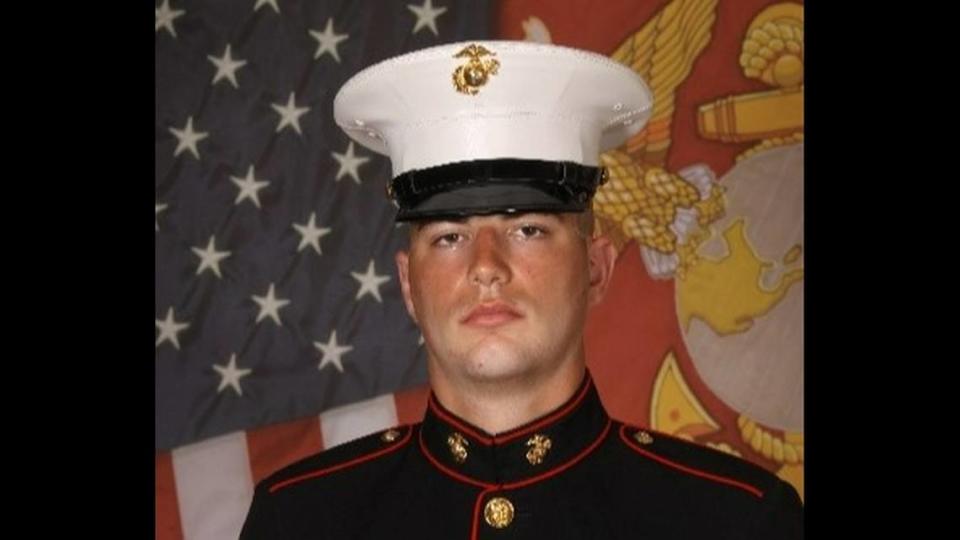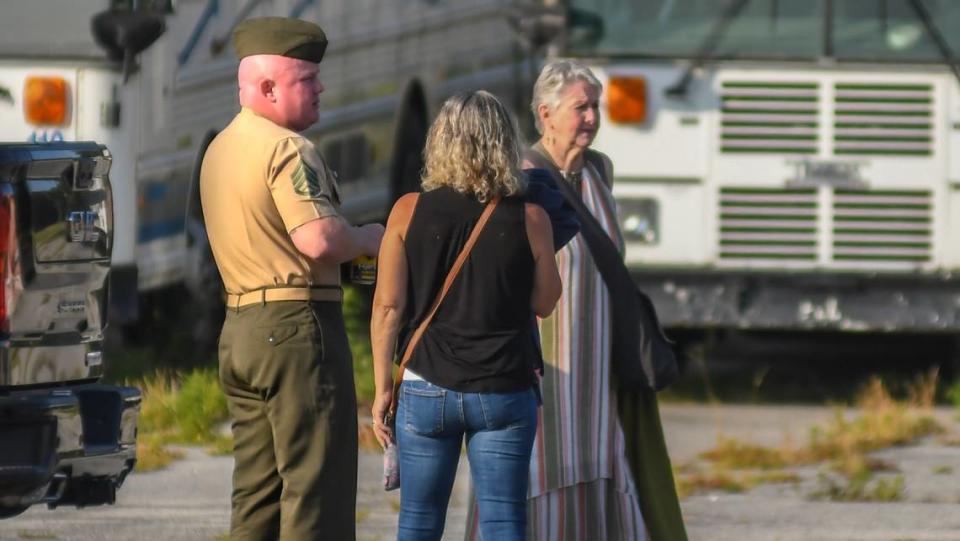Recruit died ‘alone in the woods’ at Parris Island. ‘How’ is the key question at Marine’s trial
A drill instructor didn’t do his job and a recruit died of heat stroke as a result. Or, the recruit had an unknown heart condition and his death could not have been prevented.
Those polar opposite views were presented at opening arguments Tuesday of a Marine Corps’ drill instructor who is facing multiple charges — including negligent homicide — stemming from the June 4, 2021 ,death of 19-year-old recruit Dalton Beals during his final hours of training at Marine Corps Recruit Depot Parris Island in Port Royal.
Described by his fellow recruits as a “big, strong kid” who was a “really good recruit,” Beals died during the Crucible, a rite-of-passage held during week 10 of training at Parris Island when recruits march 48 miles over 54 hours through 36 stations and problem-solving exercises.
How he died — was it negligence or an unavoidable tragedy? — is the focus of the trial of drill instructor Staff Sgt. Steven Smiley scheduled to last three weeks. Up to 50 witnesses are listed with 30 or so expected to be called.

Besides negligent homicide, Smiley is charged with dereliction of duty resulting in death, violation of the recruit training order, maltreatment of recruits and obstruction of justice. Smiley has pleaded not guilty.
The trial, before Judge Col. Adam J. Workman, has brought the families of both Smiley, who hails from Michigan, and New Jersey native Beals to a small courtroom at Parris Island.
Both sides are hoping to see justice delivered by an eight-person jury.
The prosecution’s opening
Beals was found in the woods after a long hike over exposed asphalt in extreme heat, Maj. James Saccardo, a prosecutor for the government, said during opening arguments Tuesday. He had wandered off. Beals, said Saccardo, died “alone in the woods.” He had been missing for an hour.
Saccardo blamed Smiley for not seeing the signs or heeding concerns expressed by other recruits.
Red flag conditions turned into black flag conditions during the training, meaning it was above 90 degrees. Still, Smiley pushed the recruits with additional training exercises including “buddy squats” in which recruits do squats with another recruit on their back, Saccardo said. One recruit served as a “look-out” and the recruits counted off the number of squats in hushed tones rather than barking them out as they usually do, Saccardo said.
Earlier that day, other recruits recognized Beals was suffering from heat-related illness and poured water on him after he refused it, Saccardo said, adding that an autopsy showed he died of heat stroke. At one point, Beals collapsed and needed the help of another recruit to stand him up and hold him steady, Saccardo said.
“He’s panting, he’s sweating profusely,” Saccardo said. “He has his head down.”

Smiley snapped at recruits who tried at various points to bring his condition to his attention or inquire about Beals’ whereabouts after he went missing, Saccardo said. “What pig?” he said to one recruit who tried to approach him, Saccardo said.
Finally, Smiley walked up to Beals and asked him what was wrong but left after Beals replied, “Nothing, sir.”
“He doesn’t even ask a single follow-up questions seeing him in that state,” Saccardo says.
In the days following Beals’ death, the prosecution contends, Smiley told recruits to get their stories straight before speaking with investigators with the Naval Criminal Investigative Service, Saccardo said.
Negligent homicide does not involve criminal intent, Saccardo told the jurors.
“He is charged with not doing his job,” Saccardo said of Smiley.
The defense’s opening
Maj. Brentt McGhee, one of Smiley’s defense attorneys, said the prosecution’s case is “riddled with reasonable doubt.”
Beals’ death was unknowable, unpredictable and unforgettable, McGhee said.
A second autopsy, done at the request of Beals’ family, indicated that he had a unknown heart condition that led to an unpredictable death which, while a tragedy, isn’t the result of negligent homicide. Due to that condition, McGhee said, Beals could have died in an air conditioned room and anything short of a heart transplant would not have helped him.
So why is Smiley charged?
“It’s easier to point at the senior drill instructor and that’s what the government is doing,” McGhee said.
Convicting Smiley would be a second tragedy, said McGhee.
The Marines did everything they could do to take care of and train every Marine on the day that Beals died, McGhee told the jurors, calling them the last line of protection for Smiley.
Beals was know for being exceptionally tough, McGhee said, and Smiley did ask him if he was OK and he replied, “I’m fine sir”— just a little tired.
He told others he was fine, too, McGhee added.
The government wants you to think that Beals just wandered off and nobody noticed, McGee told the jurors. What really happened, he said, is that chaos erupted after another recruit, from another squad, went down because of the heat. Smiley was among those who ran to help that recruit and saved his life, McGhee said.
Recruits were regularly asked by others during the Crucible if they needed anything and nobody mentioned Beals’ condition or that he was missing, McGhee said.
McGee said Smiley wasn’t trying to influence what recruits said prior to their meetings with NCIS investigators, McGhee said. He just told them tell the truth, McGee said. And calling recruits “pig” was not considered derogatory to the recruits, McGhee said, adding they had embraced the name “war pigs.”
Wednesday morning the prosecution will continue presenting its case.

